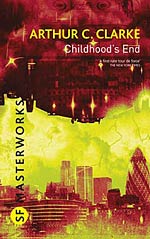
![]() couchtomoon
couchtomoon
3/15/2014
![]()
To my continued bafflement, it seems like every SF recommendation list and message board suggests Arthur Clarke's Rendezvous with Rama as a highly enjoyable and critical must read. My experience with that novel was less than satisfactory, so I thought I might have hit an overall author dud in terms of taste. But its twenty-year predecessor, Childhood's End, has always niggled me as something I would like to read, and the experience was far more entertaining than I expected. I'm surprised Rama gets more online discussion.
Thirty years after the end of WWII, alien ships fill the skies of the world's biggest cities. The aliens will not reveal themselves, but lead Overlord Karellen communicates his expectations through one perplexed bureaucrat, Rikki Stormgren. Over the next eighty years, the world changes due to the Overlords' indirect peaceful, yet intrusive rule, but their interest in Earth's affairs remains a mystery.
More than fifty years after the publication of H. G. Wells' War of the Worlds (and its many inspired variations), thirty-year-old Clarke wrote Childhood's End to address the antagonistic and earthbound characterizations of the typical alien invasion scenario. Ever the pragmatic scientist, Clarke uses Childhood's End to push the invasion scenario beyond shock-and-awe and into a complex political event with serious sociological repercussions. The aliens (Overlords) engage in diplomacy, with occasional inflexible commands and, on the rare occasions when that fails, they exercise a metaphysical manipulation that's more paternalistic than aggressive. Rather than the frenzied running and swooning ofWOTW, the humans in Childhood's End react warily, but their distrust eventually fades to shrugging acceptance, if not absolute faith.
They behave much like a nation under the sway of a new government. It's easy to see some mid-twentieth century commentary considering the benevolent fascism of the Overlords, and the bland utopia that results from their rule. "When the Overlords had abolished war and hunger and disease, they had also abolished adventure" (p. 85). The arts and sciences are sacrificed as well. But not only is Clarke commenting on the burgeoning communist governments of his era, he is also sharing his vision for a world of mixed human race and no political borders, as evidenced in the Overlords' influence over the deterioration of political borders, and the freedom of travel and interaction enjoyed by his characters. The Overlords maintain that the human race cannot advance to its undisclosed fate until they are unified as one planetary utopia.
The world of Childhood's End is a world of peace and interconnectedness, progressive even in its casting. Some might be surprised to learn that one of the primary characters, the hero in the final act, is a male of mixed white/black ancestry– pretty forward-thinking for a story first published in the 1940's. However, a bit of "the white man's burden" vibe carries through some of the early chapters, which is likely to be an overlooked naiveté, rather than any literary reflection of the evolving "Overlord's burden." And, although the mixed race character is an engineering student, his mixed race sister serves only as a trophy wife to another (assumed-to-be-white) character. Still, this novel is a far cry from Clarke's later Rendezvous with Rama, where the stale, assumed-to-be-white characters bear no distinctive markings, (not even personality).
In Childhood's End, the characters are not fully-fleshed– it is a short novel that spans generations and many characters– but they are distinguishable from one another. Despite the forward moving story line, the story itself is rather non-linear in tone and characterization. It's essentially several short-stories cobbled together into novel format, probably the fault of its serialized origins. The middle of the book doesn't feel like the beginning of the book, and the ending is light years away (literally!) from the rest of the book in tone, with sort of an Ender's Game vibe.
And yes, we do get to travel light years away from Earth! Because, regardless of the political and social commentary, Clarke's ultimate goal for this novel is to take an alien invasion story and return it to its home planet. Clarke is a man of galactic imagination. The author who prefers to give more personality to his spaceships rather than his characters. So it's no surprise that the novel builds toward a round trip visit to the Overlords' strange world, as little an impact as that may have on the conclusion of the novel. But it's fun, and at this point I'm aware that Clarke's imaginative visualizations often overshadow his plots.
But the most impressive feature of this little book is the Overlord reveal, which occurs early in the first half of the novel. The Overlords' reluctance to reveal themselves at first is just as baffling and suspenseful to the reader as it is to the characters. When the moment finally happens, Clarke demonstrates his clever ingenuity and understanding of the human race, which makes for a forehead-slapping Aha!-moment. It's the best part of the tale.
There are at least a couple of lessons in Childhood's End. First, beware the benevolent dictator. He'll take your conflict and sorrow, but also your progress and growth. Second, if you have to choose between safety with ignorance, or risk with progress, take the risk.
I can add a third: ignore what they say on Reddit. When given the choice between Rendezvous with Rama or Childhood's End, go with the latter.
http://couchtomoon.wordpress.com/2014/03/14/childhoods-end-1953-by-arthur-c-clarke/